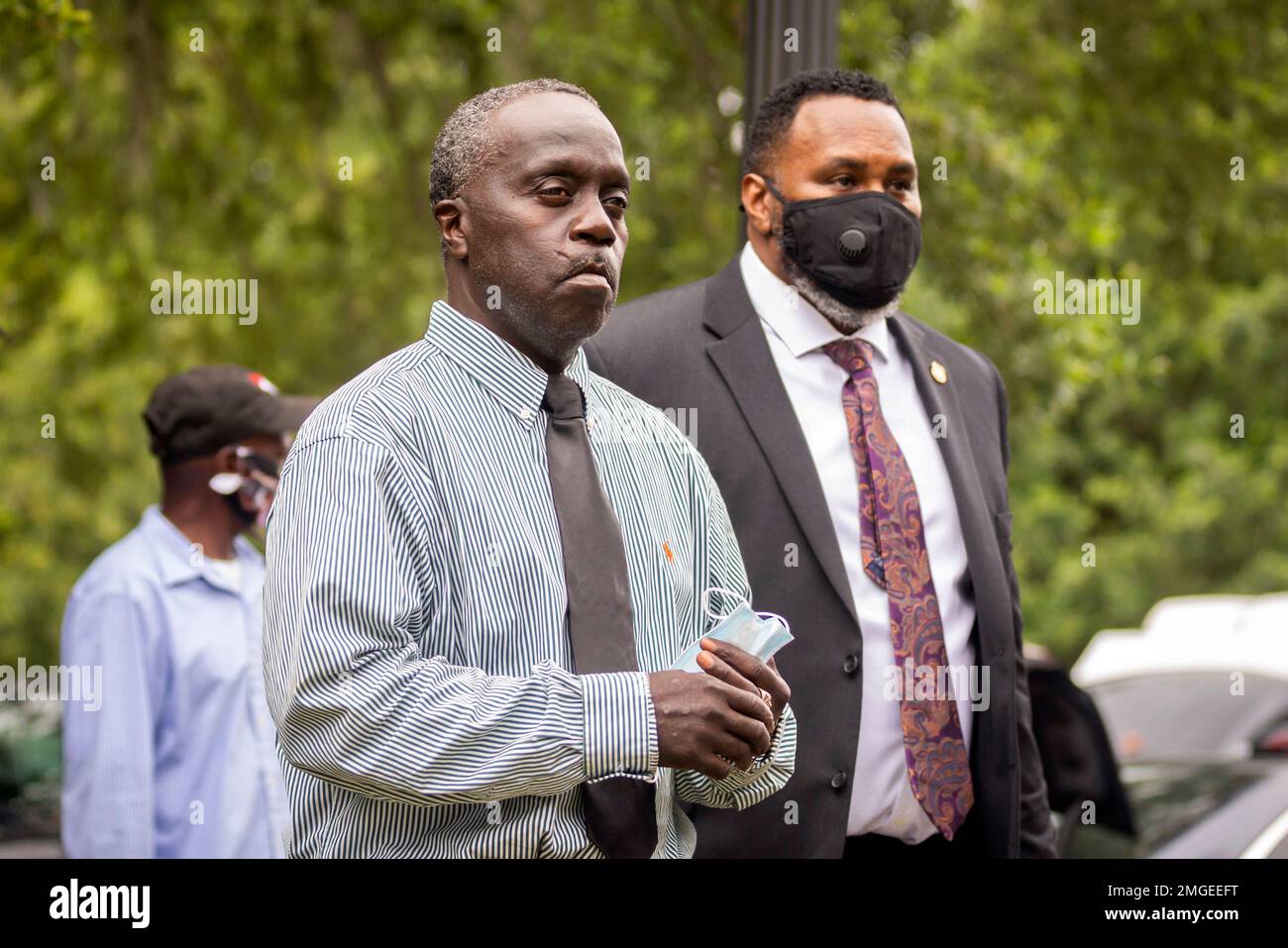Ahmaud Arbery Case: Travis Marriage Drama & Latest Updates
Can a community ever truly heal after a racially charged tragedy that exposes deep-seated prejudices and systemic failures? The Ahmaud Arbery case, a stark reminder of racial injustice, continues to reverberate through the legal system and the collective consciousness, even after convictions have been secured. The pursuit of justice remains a complex and evolving process, fraught with challenges and ongoing legal battles.
The initial aftermath of Ahmaud Arbery's death was marked by a glaring absence of accountability. His killers, Greg McMichael, his son Travis McMichael, and their neighbor William "Roddie" Bryan, initially walked free, sparking outrage and demands for justice. The fact that arrests were not immediately made fueled suspicions of racial bias within the local law enforcement and prosecutorial system. The case ignited a national outcry, forcing a deeper examination of racial profiling, citizen's arrest laws, and the pervasive influence of racial prejudice in the criminal justice system. The delayed arrests became a central point of contention, underscoring the perception that Arbery's life was not valued equally under the law.
| Topic | Information |
|---|---|
| Victim | Ahmaud Marquez Arbery |
| Date of Birth | May 8, 1994 |
| Date of Death | February 23, 2020 |
| Location of Death | Satilla Shores, Brunswick, Georgia |
| Perpetrators | Gregory McMichael, Travis McMichael, William "Roddie" Bryan |
| Charges | Murder, Felony Murder, Aggravated Assault, False Imprisonment, Criminal Attempt to Commit a Felony (Federal hate crimes charges also applied) |
| Initial Legal Response | Delayed arrests, sparking national outrage |
| Key Evidence | Video footage of the shooting recorded by William "Roddie" Bryan |
| Outcome | All three defendants found guilty of murder and federal hate crimes. |
| Impact | Renewed focus on racial profiling, citizen's arrest laws, and systemic racism in the justice system. |
| Further Reading | The New York Times Coverage of the Ahmaud Arbery Case |
Former District Attorney Jackie Johnson found herself embroiled in controversy due to her handling of the initial investigation. Johnson recused herself from the case because Greg McMichael, one of the shooters, had previously worked as an investigator in her office. However, critics argue that her actions prior to recusal hindered the investigation and contributed to the delay in arrests. Johnson's initial understanding, reportedly, was that Arbery was shot while committing a crime, a narrative that aligned with the McMichaels' claims of self-defense and citizen's arrest. The perception of bias and mishandling led to accusations that Johnson deliberately obstructed justice, further fueling public distrust in the legal system. Adding to the emotional weight of the situation, Johnson reportedly cried as she recalled a brief meeting with Ahmaud Arbery's mother shortly after the video of the shooting became public, highlighting the human cost of the tragedy and the immense pressure surrounding the case.
- The Untold Story Of Band Of Brothers Captain Sobel Fact Vs Fiction
- Diplos Kids Baby Mamas A Look At His Family Life
The attorneys representing Greg McMichael, Travis McMichael, and William "Roddie" Bryan mounted a vigorous defense, seeking to overturn the guilty verdicts. Their arguments included claims of a tainted jury and ineffective counsel, alleging that these factors deprived their clients of a fair trial. The defense team attempted to cast doubt on the prosecution's case, raising questions about Arbery's intentions and the legality of the defendants' actions under Georgia's citizen's arrest law at the time. These legal maneuvers underscored the complexities of the case and the ongoing efforts to challenge the outcome, prolonging the legal battle and adding further pain to Arbery's family and the community.
The trial itself was a focal point of national attention, with many viewing it as a crucial test of the justice system's ability to address racial bias. The prosecution presented a compelling case, highlighting the defendants' racial animus and the lack of legitimate justification for their actions. The video footage of the shooting, recorded by William "Roddie" Bryan, served as a key piece of evidence, providing a stark and irrefutable account of the events that led to Arbery's death. The jury's request to re-watch the video underscored its importance in their deliberations, highlighting the visual evidence that contradicted the defense's claims of self-defense and citizen's arrest. The atmosphere surrounding the trial was tense, with protests and demonstrations calling for justice for Ahmaud Arbery.
Ahmaud Arbery's parents have been unwavering in their pursuit of justice, consistently advocating for accountability and systemic change. They have voiced concerns that justice would not be fully served until officials who allegedly hindered the initial investigation were also held accountable. Their advocacy has kept Arbery's name and story in the public eye, ensuring that the case remains a catalyst for broader discussions about racial justice and police accountability. The parents' determination to seek justice for their son has inspired many and fueled the movement for social change.
- Leo Virgo Cusp Are You One Traits Compatibility More
- Khabib Nurmagomedovs Wife All About Patimat 2024 Update
The narrative presented by the McMichaels and Bryan painted a picture of Arbery as a suspected thief, justifying their pursuit and confrontation. They claimed they believed Arbery was responsible for recent burglaries in the neighborhood and were attempting to make a citizen's arrest. However, the prosecution argued that there was no evidence to support these claims and that the defendants acted on racial bias and assumptions. The prosecution highlighted the fact that Arbery was unarmed and posed no immediate threat, challenging the defense's assertion that their actions were justified. The conflicting narratives underscored the racial undertones of the case and the dangers of racial profiling.
The circumstances surrounding Arbery's death, on February 23, 2020, involved him being pursued by Greg and Travis McMichael in their neighborhood. The pursuit began when the McMichaels spotted Arbery running and, based on their suspicions, decided to confront him. They armed themselves and chased Arbery in their pickup trucks, ultimately leading to the fatal encounter. The fact that Arbery was simply jogging through the neighborhood when he was confronted by armed individuals sparked outrage and raised questions about the rights and safety of Black individuals in public spaces. The pursuit itself was seen by many as an act of aggression fueled by racial bias.
The federal hate crimes trial added another layer of complexity to the case, focusing on the defendants' motives and whether they acted out of racial animus. The prosecution presented evidence of racist statements and social media posts made by the defendants, demonstrating their prejudice against Black people. The jury ultimately found the three white men guilty on all counts in the federal hate crimes trial, sending a strong message that racial violence would not be tolerated. The verdict was seen as a significant victory for Arbery's family and supporters, affirming that his murder was motivated by racial hatred.
The jury's verdict in the federal hate crimes trial elicited a range of reactions, but reports indicated that there was no discernible reaction from the defendants themselves immediately after the verdict was read. The lack of visible remorse or acknowledgment of wrongdoing further fueled the perception that the defendants remained unrepentant for their actions. The absence of a reaction also highlighted the deep-seated racial biases that may have influenced their behavior, suggesting a lack of understanding or empathy for the impact of their actions on Arbery's family and the broader community.
The moderator team overseeing online discussions about the case has emphasized the importance of respectful dialogue and adherence to community guidelines. They have committed to providing updates as they become available, ensuring that the public remains informed about the latest developments in the case. The moderators have also urged users to familiarize themselves with the rules before posting, emphasizing the need to maintain a civil and respectful environment for discussing this sensitive and emotionally charged topic. Their efforts aim to promote constructive conversations and prevent the spread of misinformation or harmful content.
During the deliberations, the jury's request to watch the video of the shooting again underscored the importance of this evidence in their decision-making process. The video provided a clear and irrefutable account of the events that led to Arbery's death, contradicting the defense's claims of self-defense and citizen's arrest. The jury's repeated viewing of the video suggests that they were carefully scrutinizing the evidence and seeking to fully understand the circumstances of the shooting before reaching a verdict. The video ultimately played a crucial role in securing the convictions of the three defendants.
The jury deliberations were marked by intense discussions and careful consideration of the evidence presented. An update indicated that the jury took a lunch break during their deliberations, suggesting that they were engaged in a lengthy and thorough process. The fact that there was still no verdict after several hours of deliberation highlighted the complexity of the case and the gravity of the decisions facing the jurors. The public awaited the verdict with bated breath, recognizing the significance of the case for racial justice and accountability.
Even with convictions secured, questions linger about systemic changes needed to prevent similar tragedies. The Ahmaud Arbery case serves as a somber reminder of the work that remains to be done in addressing racial bias and ensuring equal justice for all. The legal proceedings may have concluded, but the fight for equality and justice continues.
- Bollywood Buzz Your Guide To New Hindi Movies News
- Claudia Heffner Peltz Model Wife Philanthropist Full Story

Security Footage in Arbery Case Leaks, 2 New Videos Back Up Original

Ahmaud Arbery’s mother grateful for guilty verdicts

Ahmaud Arbery's father, Marcus Aubrey, center, walks away from the